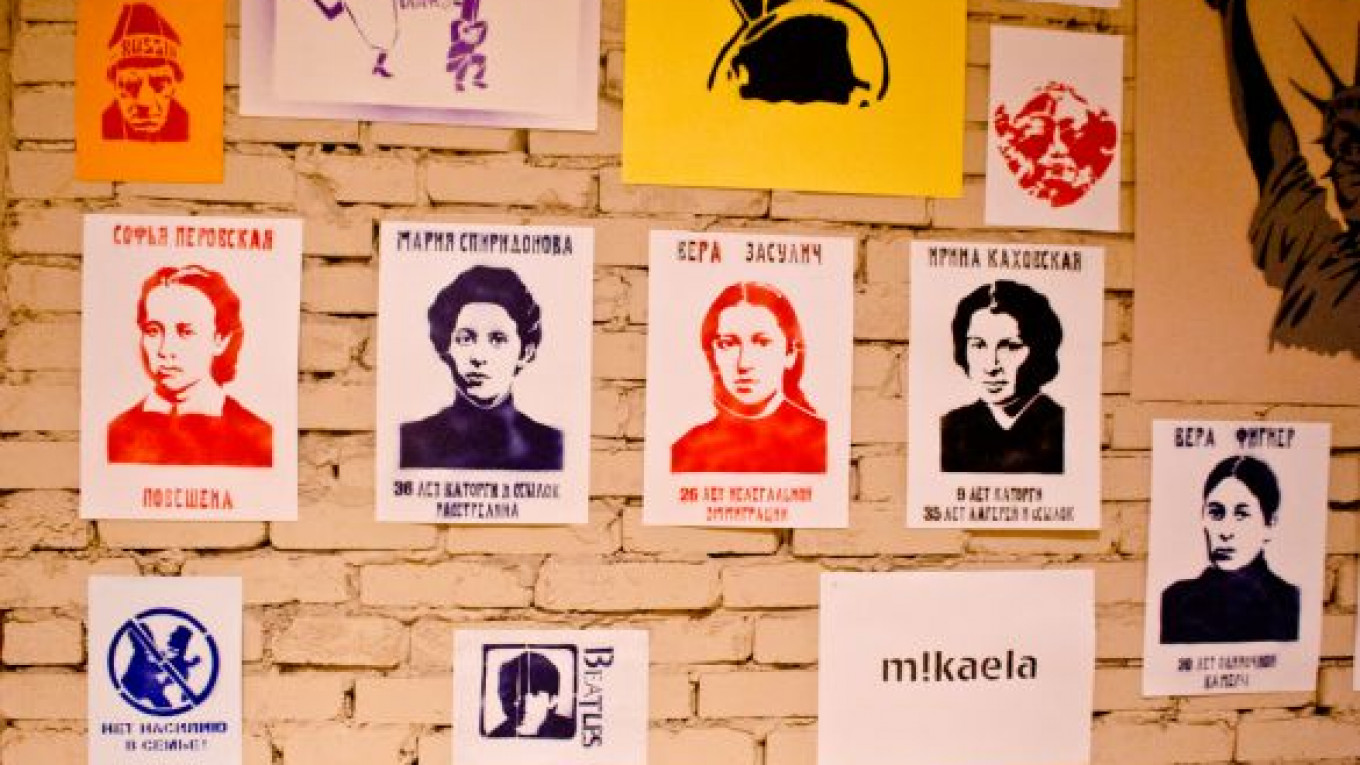ST. PETERSBURG — A new exhibition titled “Voice of the Streets” collates messages seen on city walls in St. Petersburg and other Russian cities ranging from anarchist and left-wing to feminist and pacifist.
The works for the exhibition were picked by Stanislav Reshetnyov, from the news site PublicPost and Alexandra Kachko, a local artist known for her cut out paper graffiti.
Art was collected directly from the streets in the form of photos and reprints. According to the curators, the only selection criteria were that the works should have a clear message and express a plea for dialog.
The exhibit was hit by scandal after the arts center where it is being shown asked for a work made by the group Ispravlyai! Ugarai! (Correct! Hoot!) to be removed. The group had altered a City Hall outdoor advertisement for the new Russian public holiday People’s Unity Day, celebrated annually on Nov. 4.
Artists replaced the faces of the Virgin Mary and baby Jesus on the poster with those of President Vladimir Putin and Prime Minister Dmitry Medvedev in what the arts center said was an “anti-religious message.”?
“Considering the situation in the country now, we realize that religious people might stage a protest,” a manager at the center was quoted by Interfax as saying. “So at our own initiative, we decided to preempt that.”
“We were confronted with the decision to close the exhibition or to compromise and remove the picture,” Reshetnyov wrote. “We could have shut the exhibition down, but we need it to exist so that the ideas spread.”
There were no objections to other anti-clerical works, such as a bust of Patriarch Kirill with a coin slot in his head, a reference to recent scandals over the commercial activities of the church. An image of Kirill as a money box is repeated on a painting, showing a hand dropping a coin in his head slot.
The patriarch as a money box was originally created by Slava PTRK, an artist from Yekaterinburg, as graffiti, and was remade as a bust for the exhibition.
One of the most popular graffiti anti-heros in the exhibit is President Vladimir Putin.
“In fact, a lot of people do Putin, so at one point we decided to stop collecting Putin and Gundyayev [Patriarch Kirill’s birth name], because it is not profound and has grown tiresome,” Kachko said.
Inevitably, the slogan “Free Pussy Riot” can also be found among much of the work at the exhibition. “Bye Bye, Democracy” shows three colored-balaclava-clad faces behind prison bars.
Many works are devoted to street protests and their dispersals by the OMON riot police. Kachko’s own large-scale work called “Partizany” (“Guerrillas”) depicts policemen, protesters and her Zoa character sitting, detained, in a police van, all made out of paper.
As an activist with The Other Russia, Kachko has been a frequent sight at protests and had her wrist broken by an OMON policeman while being detained on July 31, 2011.
One of Kachko’s graffiti works shows a girl with her mouth plastered with the number “282,” the Criminal Code’s “counter-extremism” article, which is often used to suppress political dissent.
According to Kachko, some street artists did not participate because the organizers could not meet their demands. “There were people who asked for fees or, for instance, their second-class train fare or hotel accommodation to be covered,” she said. “But our budget was very modest; for instance, Stas [Reshetnyov] and I worked for free as the curators. But there were people who painted everything, brought it, nailed it up and didn’t want anything in return.”
The “Voice of the Streets” exhibition runs through Dec. 14 at Loft Project Etagi, 74 Ligovsky Prospekt. St. Petersburg. Tel. (812) 458-5005. www.loftprojectetagi.ru
A Message from The Moscow Times:
Dear readers,
We are facing unprecedented challenges. Russia's Prosecutor General's Office has designated The Moscow Times as an "undesirable" organization, criminalizing our work and putting our staff at risk of prosecution. This follows our earlier unjust labeling as a "foreign agent."
These actions are direct attempts to silence independent journalism in Russia. The authorities claim our work "discredits the decisions of the Russian leadership." We see things differently: we strive to provide accurate, unbiased reporting on Russia.
We, the journalists of The Moscow Times, refuse to be silenced. But to continue our work, we need your help.
Your support, no matter how small, makes a world of difference. If you can, please support us monthly starting from just $2. It's quick to set up, and every contribution makes a significant impact.
By supporting The Moscow Times, you're defending open, independent journalism in the face of repression. Thank you for standing with us.
Remind me later.


